Cause Of Explosions, Gunfire West Of Tehran Remains Unclear
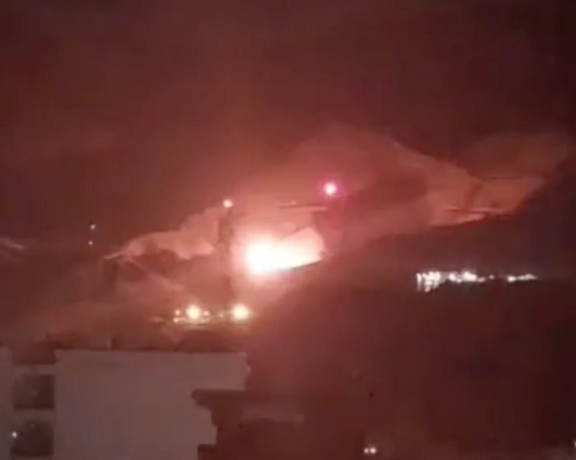
Residents near Karaj, west of Tehran, published videos of anti- aircraft fire Thursday night, which the government media described as military drills by the IRGC.

Residents near Karaj, west of Tehran, published videos of anti- aircraft fire Thursday night, which the government media described as military drills by the IRGC.
One of these videos showing anti-aircraft tracer rounds soaring into the sky an explosion can also be seen on the ground, but no further information is available. There was no prior public notification of planned military exercises.
Some residents reported on social media that first a series of explosions were heard and then anti-aircraft guns began firing into the air.
Fars news agency affiliated with the Revolutionary Guard reported Thursday night that the sound of guns firing and explosions were coming from drills by IRGC’s paramilitary Basij forces in Shahid Motahari military base near Karaj, about 30 km west of the capital.
Iran has been the scene of several suspected air attacks and sabotage operations since July 2020, largely ascribed to Israel. Any sound of aircraft or explosions usually jolts the population and leads to speculations of another attack taking place.
Serious acts of sabotage targeted Iran’s nuclear installations in 2020 and 2021 and several unexplained explosions occurred at military and naval bases.
The latest incident occurred on January 28 around midnight when a military manufacturing center in the city of Esfahan was attacked by drones.
The Wall Street Journal quoting unnamed US officials reported that the attack was carried out by Israel.
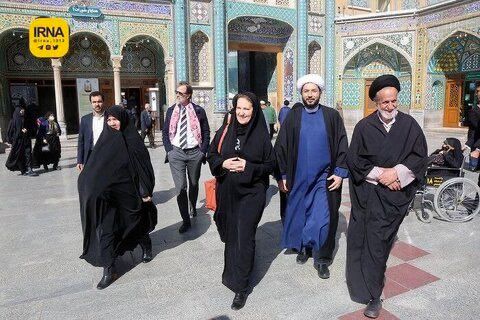
The Swiss Foreign Ministry defended the decision by its ambassador in Tehran, Nadine Olivier Lozano to wear the full body veil, the chador, on a visit to Qom yesterday (Wed) following global outrage claiming the undermined five months of protests against the compulsory hijab.
Léa Zürcher, the Foreign Ministry spokesperson, claimed the ambassador had visited the holy city of Qom to attend an interfaith event at an unnamed university. Zurcher claimed “a short visit to an important religious site took place” and “the applicable dress protocol for women was followed”.
However, the black chador which covers the whole body, is not required of visiting female foreign dignitaries who can simply wear a long headscarf at the site.
Social media was flooded with condemnation, including leading political voices around the world who said the move flew in the face of global support for the protests which were sparked by the death in custody of Mahsa Amini, arrested by the morality police for the inappropriate use of her hijab. The nationwide protests have since seen hundreds killed and thousands more arrested since September in brutal crackdowns by security forces.
Hillel Neuer, Executive Director at Human Rights Watch, tweeted: "Meet Nadine Olivieri Lozano, Swiss Ambassador to Iran and star of the murderous regime's propaganda. While women in Iran are being beaten, blinded, tortured, raped and killed for daring to protest the compulsory hijab laws, she is complicit in her head-to-toe chador and hijab."
The Swiss embassy, responding to the global outrage, denied the move undermined the human rights aspect of the protests which deny women the basic right to choose how to dress.
“Switzerland repeatedly and clearly takes a stand on human rights violations in Iran,” Zurcher added. “In recent months, it has repeatedly and unequivocally condemned the use of violence against the demonstrators at various levels and also called on the Iranian authorities to choose the path of de-escalation and to seek dialogue with the demonstrators.”
During the visit, Lozano is seen with several clerics, gifted a religious book from one of the shrine’s caretakers at Iran's second most holy city, after Mashhad, home to the biggest and most prestigious of Iran's Shiite seminaries. Qom has been at the center of controversy for years, its institutions being disproportionately funded, not least, while the country is suffering from a bitter economic crisis.
Institutions such as the Al-Mustafa International University attract foreign students from countries across China, Africa and Latin America, teaching them the foundations of Shia Islam to take back to their countries, at the expense of the Iranian people, while millions of Iranians cannot afford to eat or heat their homes during the bitter winter months.
Masih Alinejad, a leading Iranian activist in exile, whose life was recently threatened by the country's security forces, called the ambassador’s decision “shameful” and a “betrayal to Iranian women”.
She tweeted: “While teenagers & women are getting beaten, jailed & killed for saying NO to forced hijab, NO to gender apartheid regime, Swiss ambassador in Iran obeyed forced hijab …Switzerland must respond why they took side with our killers.”
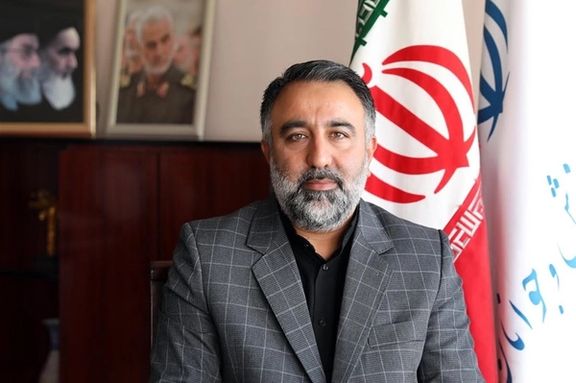
The helicopter carrying the minister of sports, Hamid Sajjadi, has crashed in southern Iran while landing in the sports complex of Baft city.
Hospital sources reported that the sports minister's adviser, who was injured in the accident, has lost his life. The adviser who died was Esmail Ahmadi, who was the IRGC liaison in the ministry and was in charge of putting pressure on athletes who removed hijab during national and international competitions.
Media in n Tehran say that the minister has cerebral hemorrhage, although the government’s official news website IRNA has not reported about his injury.
Local media report that at least four passengers were also injured and transferred to medical centers.
In an interview with IRNA, an eyewitness said he saw several people taken to medical centers after the chopper lost control while landing.
A photo of the accident shows a part of the copter is detached.
Alireza Poursalman, the head of Iran’s Fencing Federation, was accompanying Sajjadi on the trip. Some other local officials along with a group of journalists had gone to Baft with the minister.
IRNA cited Kerman’s governor, Mohammad-Mehdi Fadakar, as saying that the cause of the crash is under investigation.
In January, the European Union imposed sanctions on Sajjadi over Tehran’s crackdown on anti-regime protests.
The sanctions included a travel ban and asset freeze on the minister, who the EU accused of pressuring Iran’s athletes into silence.
Iran International obtained some documents in December 2022 showing that the security of the Ministry of Sports, in a confidential letter, asked the federations and all provincial offices to prevent athletes from showing support for nationwide protests following the death of Mahsa Amini.
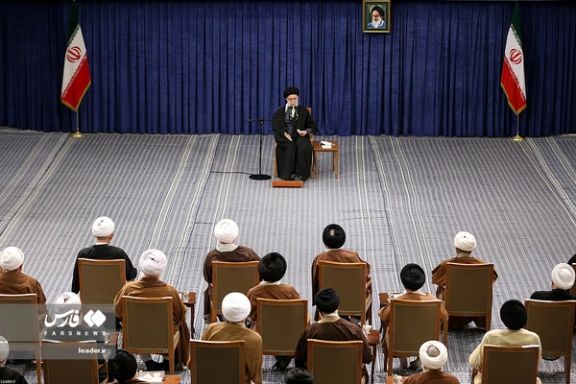
The Islamic Republic’s Assembly of Experts, the deliberative body empowered to appoint the Supreme Leader, has renewed its loyalty to Iran’s ruler Ali Khamenei.
The Secretariat of the Assembly -- also translated as the Assembly of Experts of the Leadership or as the Council of Experts – issued a statement on Wednesday, reiterating obsequious remarks about Khamenei.
In their statement, the members of the assembly described Khamenei as a force of “solidarity and national unity," and decried the slogans and slurs that are chanted against him during popular protests for over five months.
Members of the Assembly are elected from the inner circle of the regime and people very close to the Khamenei, which explains their full loyalty. The assembly – which is in charge of supervising, dismissing and electing the Supreme Leader – can run for election after being vetted by the Guardian Council, whose members are, in turn, appointed either directly or indirectly by the Supreme Leader.
The Guardian Council is composed of six Islamic law experts, selected by the Supreme Leader, and six jurists, nominated by the Chief Justice, who in turn, is also appointed by the Supreme Leader. Therefore, it is a self-serving closed-circuit system that ensures all key constitutional position are occupied by loyalists.
Interestingly enough, the head of both bodies is hardliner cleric Ahmad Jannati, who turned 96 on Wednesday, a day after he was re-elected as the chairman of the Assembly of Experts for another two years. First Deputy Chairman of the assembly is President Ebrahim Raisi.
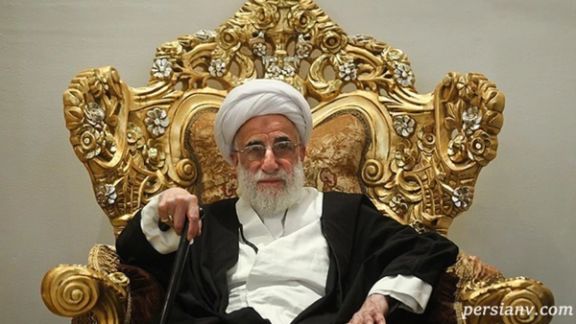
The assembly’s statement repeatedly glorified Khamenei, claiming that the "unprecedented large volume of propaganda and insults" against him indicates that the enemy understands his important role in “guidance and management of society.”
The statement also reiterated calls for the preservation of "hijab" -- or Islamic dress code -- as a clear message of the Islamic revolution and one of the "elements of the identity of the Islamic Republic of Iran". The current wave of protests, the boldest the regime has ever faced in the 43 years of its existence, was ignited when hijab enforcement patrols arrested Mahsa Amini violently that led to her death at hospital due to severe trauma on her head.
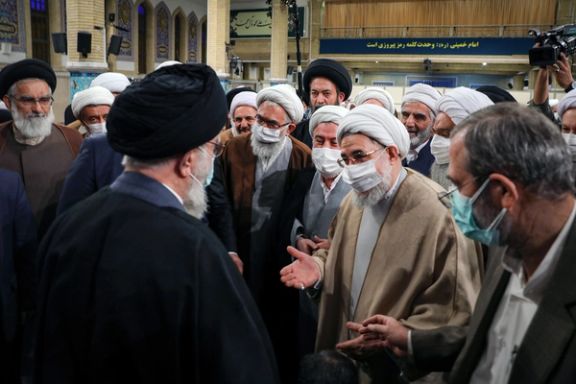
In a meeting with the chairman and some members of the Assembly of Experts in Tehran on Thursday, Khamenei said that the Islamic establishment “opposes those who believe in the Western secularism and opposes the leaders of liberal democracy, who have hatched a plot to dominate over and plunder the world’s resources behind the false flag of freedom and democracy,” he said.
According to a confidential letter obtained by Iran International in recent days, the Revolutionary Guard (IRGC) has asked the government not to disclose the budget of institutions such as the Hijab police, which are criticized by the people.
The regime has heavy-handedly suppressed protesters, executing four young men, killing well over 500, including more than 70 children, and arresting around 20,000 in the past five months.
On Monday, an estimated crowd of about 20 to 30 thousand people held a rally in Brussels outside the European Council to call on EU countries to designate Iran’s Revolutionary Guard as a terrorist organization. Thousands of Iranians from all over Europe held a massive rally in Strasbourg in January for the same purpose. Also on Monday, the EU sanctioned 32 Islamic Republic officials, including culture and education ministers, deputy IRGC commander, and several MPs. The move can be seen as a measure to justify the fact that the EU is not yet ready to designate the entirety of the IRGC.
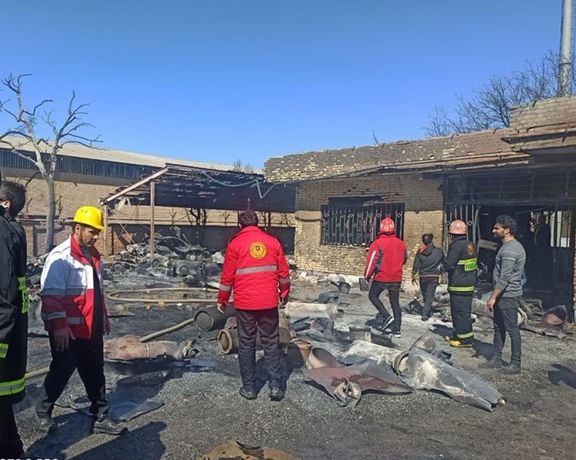
Officials in Hamedan, western Iran, says at least three people have been injured after an explosion in a large, liquefied petroleum gas charging unit.
The spokesperson of the emergency department in the city, Mohammad Shokouhi told Tasnim news website, affiliated with the Revolutionary Guard, that three ambulances were dispatched to the place after citizens reported the blast.
“Fortunately, there are no deaths in the incident so far, but three people, including a woman and two men, are injured,” he added.
The semi-official ISNA also quoted Head of Hamedan Fire Department, Sadeq Pour-Sina as saying that a building inside the center's premises caught fire as well.
Pour-Sina stated that five vehicles caught fire in this accident, reminding that carelessness during the charging of LPG capsules was the cause of the accident. It is not possible to determine the cause of the accident from independent sources.
An LPG car is designed from the factory to run on liquefied petroleum gas, or has been converted to take LPG by an aftermarket conversion company. They are sometimes referred to as dual fuel or Bi-Fuel cars, as they can switch between LPG and petrol.
Safety experts believe that the use of liquid gas and non-standard gas cylinders in vehicles is dangerous because in case of the smallest accidents, there is a possibility of explosion.
There are 25 million cars running on LPG worldwide, including 13 million in Europe alone. However, unsafe practices may lead to a higher level of risk.

A hardliner newspaper in Tehran has demanded that German embassy staff be banned from leaving Iran in response to expulsion of two Iranian diplomats from Berlin.
The editor and representative of Supreme Leader Ali Khamenei in Kayhan Daily, Hossein Shariatmadari also called for the prosecution of a person he called an "intelligence officer stationed at the German embassy".
Shariatmadari’s demand is reminiscent of the takeover of the US embassy by radicals in Tehran after the 1979 revolution when dozens of embassy staff were held hostage for 444 days.
This hardliner editor, who is said to be one of the interrogators of political prisoners, added that "The next step should be filing a complaint against the German government at the International Criminal Court for sending terrorists to Iran to massacre the oppressed people of the country."
Iran's judiciary sentenced Iranian-German national Jamshid Sharmahd to death on security charges February 20.
Sharmahd, who is also a US resident, is accused by Tehran of heading a pro-monarchist group blamed by the government for a deadly 2008 bombing and planning other attacks in the country.
In response, Germany declared two employees of the Iranian embassy personae non gratae and ordered them to leave the country on Wednesday.
However, Shariatmadari claimed, "Sharmahd has been tasked with carrying out terrorist operations by the German government, and the action of the German Ministry of Foreign Affairs in summoning the Iranian ambassador and expelling two employees of Iran’s embassy is a type of deception operation to wipe off the traces of the German government’s involvement in this terrorist operation.”